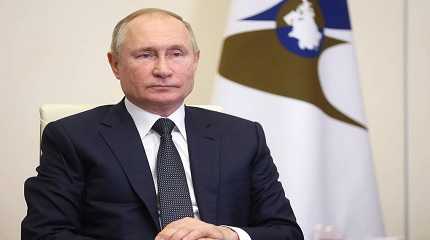
MOSCOW, Oct 3 (Reuters) - The Kremlin said on Tuesday that Russia had not abandoned a moratorium on nuclear testing, and dismissed a suggestion by the editor of a state television channel that Moscow should detonate a thermonuclear device in Siberia as a warning to the West.
President Vladimir Putin, who rules the world's biggest nuclear power, has repeatedly cautioned the West that any attack on Russia could provoke a nuclear response.
The Soviet Union's last nuclear test took place in 1990. The United States' last nuclear test took place in 1992 and France and China conducted their last nuclear tests in 1996, according to the United Nations.
The Kremlin said it had not abandoned the moratorium when asked about remarks by Margarita Simonyan, the editor-in-chief of state-funded broadcaster RT, who suggested that Russia should detonate a nuclear bomb over Siberia.
"At present, we have not left the regime of abandoning nuclear tests," Kremlin spokesman Dmitry Peskov told reporters.
"I don't think such discussions are possible now from an official point of view," Peskov said, adding that Simonyan's words did not "always" reflect Moscow's official position.
Simonyan said the Ukraine crisis was moving towards a nuclear ultimatum and that the West would not stop until Russia sent a nuclear message.
"A nuclear ultimatum is becoming more and more imminent and more and more impossible to avoid," Simonyan said. "They will not backpedal unless it is painful for them."
She quipped that such an explosion would render electronic devices useless - and thus make it easier for her to explain to her children why they were not allowed devices such as iPads.
Nuclear rhetoric from Russian state television became particularly pronounced late last year but was more subdued during the first half of this year.
NUCLEAR ERA
The United States opened the nuclear era in July 1945 with the test of a 20-kiloton atomic bomb at Alamogordo, New Mexico, in July 1945, and then dropped atomic bombs on the Japanese cities of Hiroshima and Nagasaki in August 1945 at the end of World War Two.
The Soviet Union shocked the West by detonating its first nuclear bomb just four years later, in August 1949.
In the five decades between 1945 and the 1996 Comprehensive Nuclear Test-Ban Treaty, over 2,000 nuclear tests were carried out, 1,032 of them by the United States and 715 of them by the Soviet Union, according to the United Nations.
Putin in February suspended participation in the New START treaty, Russia's last major arms control treaty with Washington.
He also cautioned that if the United States returned to nuclear testing, then Russia would resume too.
The New York Times reported on Monday that satellite imagery and aviation data suggested Russia may be preparing to test an experimental nuclear-powered cruise missile — or may have recently tested one.
"I do not know where the NYT journalists got this," the Kremlin's Peskov said. "Apparently, it is necessary to study satellite images in more detail."
"The New York Times stands behind our reporting," a spokesman for the newspaper said in an emailed statement.




